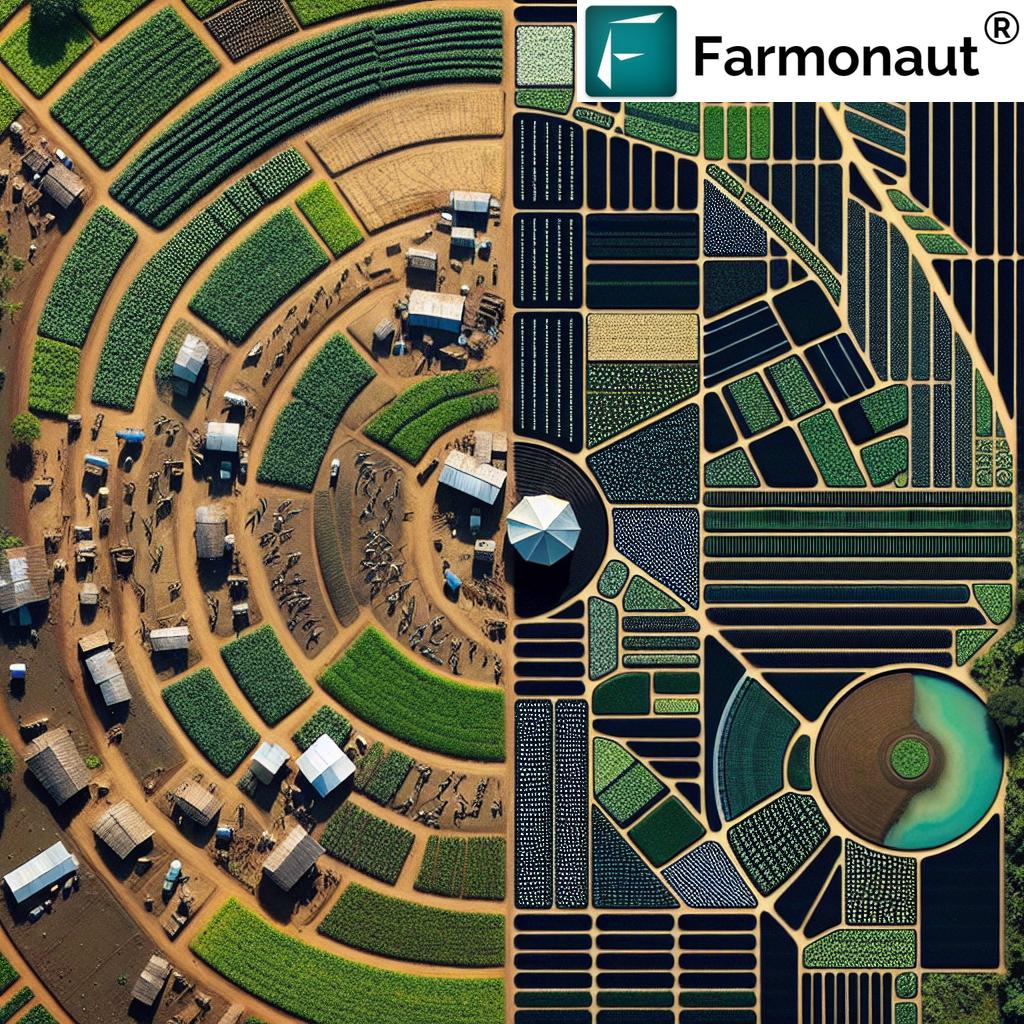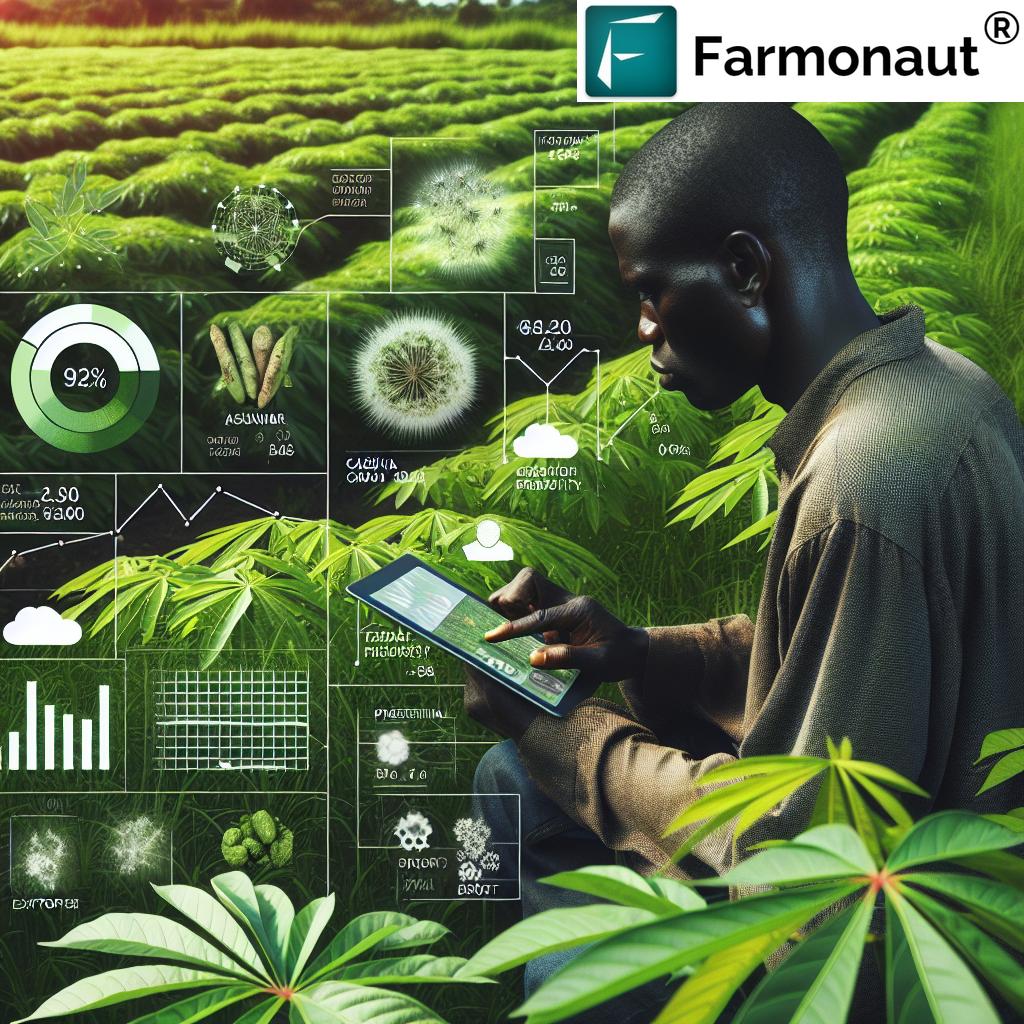Revolutionizing Liberian Agriculture: Farmonaut’s Precision Technology for Sustainable Farming and Food Security
“Liberia’s agricultural sector employs over 70% of the country’s workforce, highlighting its crucial role in the economy.”
In the heart of West Africa, Liberia stands at a crucial juncture in its agricultural journey. As we delve into the transformative potential of precision agriculture and sustainable farming practices, we explore how cutting-edge technologies are reshaping the landscape of Liberian agriculture. This comprehensive analysis examines the challenges, opportunities, and innovative solutions that are propelling Liberia towards enhanced food security and economic growth.
The Current State of Liberian Agriculture
Liberia’s agricultural sector is a cornerstone of its economy, providing livelihoods for a significant portion of the population. However, the sector faces numerous challenges that hinder its full potential:
- Reliance on traditional farming methods
- Limited access to modern agricultural technologies
- Vulnerability to climate change impacts
- Underdeveloped infrastructure in rural areas
- Inadequate access to markets and financial services
Despite these challenges, recent data from the Liberia Institute of Statistics and Geo-Information Services (LISGIS) reveals promising developments in the agricultural landscape.

Agricultural Modernization in Liberia: A Path to Sustainable Growth
The push for agricultural modernization in Liberia is gaining momentum, driven by the need to enhance productivity, ensure food security, and boost economic development. Key aspects of this modernization include:
- Adoption of precision agriculture technologies
- Implementation of sustainable farming practices
- Crop diversification techniques
- Improved irrigation systems
- Enhanced agricultural data analytics
These advancements are crucial for addressing Liberia’s food security challenges and improving agricultural productivity. As we navigate through this transformation, innovative solutions like those offered by Farmonaut play a pivotal role in bridging the gap between traditional practices and modern agricultural technologies.
Farmonaut: Pioneering Precision Agriculture in Liberia
Farmonaut brings a suite of advanced, satellite-based farm management solutions to Liberia’s agricultural sector. By leveraging cutting-edge technologies, Farmonaut aims to make precision agriculture accessible and affordable for Liberian farmers of all scales.
Key Features of Farmonaut’s Technology:
- Satellite-Based Crop Health Monitoring
- AI-Driven Advisory System (Jeevn AI)
- Blockchain-Based Product Traceability
- Fleet and Resource Management Tools
- Carbon Footprinting for Sustainable Practices
These technologies are tailored to address the specific challenges faced by Liberian farmers, from smallholders to large-scale agricultural operations.
Transforming Liberian Agriculture with Precision Technology
The integration of Farmonaut’s precision agriculture technologies in Liberia has the potential to revolutionize farming practices across the country. Here’s how:
- Enhanced Crop Monitoring: Satellite-based monitoring provides real-time insights into crop health, allowing farmers to detect issues early and take timely action.
- Optimized Resource Management: By analyzing data on soil moisture, nutrient levels, and weather patterns, farmers can make informed decisions on irrigation and fertilizer application.
- Improved Yield Prediction: Advanced analytics help in accurate yield forecasting, enabling better planning and market strategies.
- Climate-Resilient Farming: Access to precise weather data and AI-driven recommendations helps farmers adapt to changing climate conditions.
- Sustainable Practices: Carbon footprinting tools encourage environmentally friendly farming methods, aligning with global sustainability goals.
“Precision agriculture technologies can potentially increase crop yields in Liberia by up to 25%, boosting food security and exports.”
Addressing Food Security Challenges in Liberia
Food security remains a critical concern for Liberia. The integration of precision agriculture technologies offers promising solutions:
- Increased crop yields through optimized farming practices
- Reduction in post-harvest losses through better planning and management
- Diversification of crop production to enhance nutritional security
- Improved resilience to climate-related risks
- Enhanced market access through better quality control and traceability
By leveraging Farmonaut’s technologies, Liberian farmers can significantly contribute to the country’s food security goals while improving their livelihoods.

Rural Development Strategies and Precision Agriculture
The adoption of precision agriculture technologies aligns closely with Liberia’s rural development strategies. Here’s how Farmonaut’s solutions contribute to rural development:
- Empowering smallholder farmers with advanced tools and knowledge
- Creating new job opportunities in agritech and related sectors
- Improving rural infrastructure through the need for better connectivity
- Enhancing the overall economic viability of rural areas
- Promoting sustainable land use and environmental conservation
These advancements not only boost agricultural productivity but also contribute to the broader socio-economic development of rural Liberia.
Crop Diversification Techniques for Liberian Agriculture
Crop diversification is crucial for Liberia’s agricultural sustainability and food security. Farmonaut’s technologies support this effort by:
- Providing data-driven insights for optimal crop selection based on local conditions
- Monitoring multiple crop types simultaneously, enabling efficient mixed cropping systems
- Offering tailored advice for managing diverse crop portfolios
- Facilitating the introduction of high-value crops through precise management techniques
- Supporting the cultivation of climate-resilient crop varieties
This approach not only enhances food security but also opens up new market opportunities for Liberian farmers.
The Role of Agricultural Data Analytics in Liberian Farming
Agricultural data analytics is transforming decision-making processes in Liberian agriculture. Farmonaut’s platform offers:
- Comprehensive data collection through satellite imagery and on-ground sensors
- Advanced analytics for interpreting complex agricultural data
- Predictive models for crop yield, pest outbreaks, and market trends
- User-friendly interfaces for farmers to access and understand data insights
- Integration capabilities with other agricultural management systems
These analytics empower Liberian farmers to make informed decisions, leading to more efficient and productive farming practices.
Climate-Resilient Farming Methods for Liberia
As climate change poses significant risks to agriculture, implementing climate-resilient farming methods is crucial. Farmonaut supports this through:
- Early warning systems for extreme weather events
- Recommendations for drought-resistant crop varieties
- Soil health monitoring to maintain fertility under changing conditions
- Water management strategies to cope with irregular rainfall patterns
- Long-term climate trend analysis for strategic agricultural planning
These approaches help Liberian farmers adapt to and mitigate the impacts of climate change on their agricultural activities.
Comparative Analysis: Traditional vs. Precision Agriculture in Liberia
| Aspect | Traditional Agriculture | Precision Agriculture with Farmonaut |
|---|---|---|
| Crop Yield (estimated tons/hectare) | 1.5 – 2.0 | 2.5 – 3.5 |
| Water Usage Efficiency (%) | 40-50% | 70-80% |
| Fertilizer Optimization (%) | 30-40% | 60-70% |
| Pest Management Effectiveness (scale 1-10) | 5 | 8 |
| Climate Resilience (scale 1-10) | 4 | 7 |
| Data-Driven Decision Making | No | Yes |
| Environmental Impact | High | Low |
| Labor Requirements | High | Medium |
| Investment Costs | Low | Medium |
| Long-term Sustainability (scale 1-10) | 5 | 9 |
This comparison clearly illustrates the potential benefits of adopting precision agriculture technologies in Liberia, highlighting significant improvements across various aspects of farming.
Agribusiness Opportunities in West Africa: Liberia’s Potential
The adoption of precision agriculture technologies opens up new agribusiness opportunities in Liberia and the broader West African region. These include:
- Development of value-added agricultural products
- Expansion of agro-processing industries
- Growth in agricultural technology services and consultancy
- Increased potential for agricultural exports
- Emergence of data-driven agribusiness models
Farmonaut’s technologies can play a crucial role in supporting these emerging opportunities, contributing to the overall growth of Liberia’s agricultural sector.
Challenges and Solutions in Implementing Precision Agriculture in Liberia
While the potential benefits of precision agriculture are significant, implementing these technologies in Liberia comes with challenges:
- Limited Infrastructure: Improving rural connectivity and power supply is crucial for the effective use of digital agricultural technologies.
- Farmer Education: Comprehensive training programs are needed to help farmers understand and utilize new technologies effectively.
- Initial Investment Costs: Innovative financing models and government support can help farmers overcome the initial cost barriers.
- Data Privacy and Security: Implementing robust data protection measures is essential to build trust in digital agricultural systems.
- Cultural Adaptation: Tailoring technologies to local farming cultures and practices is crucial for widespread adoption.
Farmonaut addresses these challenges through user-friendly interfaces, scalable solutions, and partnerships with local agricultural institutions.
The Future of Liberian Agriculture with Precision Technologies
As Liberia continues to embrace precision agriculture technologies, we can anticipate significant transformations in the agricultural sector:
- Increased agricultural productivity and food security
- More resilient and sustainable farming practices
- Enhanced integration of smallholder farmers into global value chains
- Emergence of a more data-driven and efficient agricultural sector
- Greater contribution of agriculture to Liberia’s overall economic growth
Farmonaut’s ongoing innovations and adaptations to the Liberian context will play a crucial role in realizing this vision for the future of Liberian agriculture.
Conclusion: A New Era for Liberian Agriculture
The integration of precision agriculture technologies, spearheaded by innovative solutions like those offered by Farmonaut, marks the beginning of a new era for Liberian agriculture. By addressing key challenges in food security, productivity, and sustainability, these technologies pave the way for a more resilient and prosperous agricultural sector.
As Liberia continues on this path of agricultural modernization, the synergy between traditional farming wisdom and cutting-edge technology will be crucial. The journey towards sustainable, efficient, and productive agriculture in Liberia is well underway, promising a brighter future for farmers, consumers, and the nation as a whole.
FAQs
- Q: How can precision agriculture benefit smallholder farmers in Liberia?
A: Precision agriculture can help smallholder farmers in Liberia by providing accurate data on crop health, soil conditions, and weather patterns. This information enables more efficient use of resources, leading to improved yields and reduced costs. - Q: What role does satellite technology play in Farmonaut’s agricultural solutions?
A: Satellite technology is central to Farmonaut’s solutions, providing high-resolution imagery for crop monitoring, soil analysis, and weather forecasting. This data is crucial for making informed decisions in farming practices. - Q: How does Farmonaut’s technology contribute to sustainable farming in Liberia?
A: Farmonaut’s technology promotes sustainable farming by optimizing resource use, reducing chemical inputs, and providing tools for carbon footprint monitoring. This helps in maintaining soil health and minimizing environmental impact. - Q: Can Farmonaut’s solutions be adapted to different types of crops grown in Liberia?
A: Yes, Farmonaut’s solutions are versatile and can be adapted to various crops grown in Liberia, including rice, cassava, and cash crops. The AI-driven system can provide tailored advice for different crop types. - Q: How does Farmonaut address the challenge of limited internet connectivity in rural Liberia?
A: Farmonaut offers offline capabilities and low-bandwidth options to ensure that farmers in areas with limited internet connectivity can still access and benefit from its agricultural technologies.
For more information on how Farmonaut can revolutionize your farming practices in Liberia, visit our website or download our mobile app:
For developers interested in integrating Farmonaut’s technology into their own applications, check out our API and API Developer Docs.






